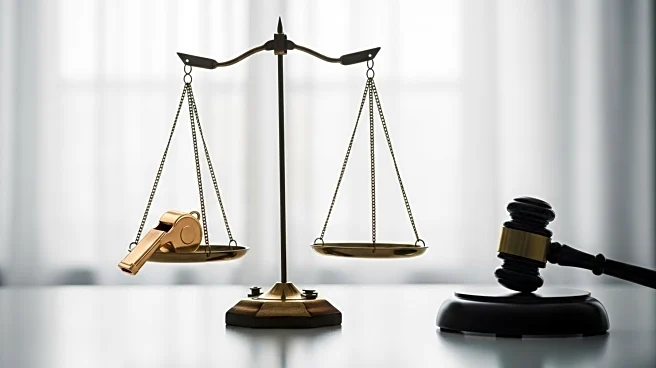What's Happening?
Ten FBI whistleblowers who reported instances of 'political weaponization' within the bureau have reached settlement agreements with the Department of Justice. These individuals faced demotions, security clearance revocations, and indefinite unpaid administrative leave under the Biden administration. The whistleblowers, represented by Empower Oversight, were subjected to over 12 years of inappropriate suspension time. The settlements include lump sum payments for damages, with some cases involving the restoration of back pay and benefits. Notable cases include FBI Special Agent Stephen Friend, who was suspended for objecting to a SWAT operation, and FBI Special Agent Garret O’Boyle, who faced accusations related to Project Veritas. The settlements do not require resignations and aim to provide some measure of justice for the whistleblowers.
Why It's Important?
The settlements highlight ongoing concerns about the treatment of whistleblowers within federal agencies, particularly regarding allegations of political bias and retaliation. This development underscores the challenges faced by individuals who report misconduct, as well as the potential for systemic issues within the FBI. The resolution of these cases may encourage other whistleblowers to come forward, knowing there is a possibility of redress. However, it also raises questions about the accountability of federal agencies and the effectiveness of current whistleblower protections. The outcome of these settlements could influence future policies and practices related to whistleblower treatment and agency oversight.
What's Next?
The settlements may prompt further scrutiny of the FBI's internal practices and the Biden administration's handling of whistleblower cases. Empower Oversight and other advocacy groups may continue to push for broader reforms to protect whistleblowers and ensure accountability within federal agencies. Additionally, the resolution of these cases could lead to increased legislative efforts to strengthen whistleblower protections and address concerns about political weaponization within government institutions.
Beyond the Headlines
The cases of these whistleblowers reveal deeper issues related to the balance between national security and individual rights. The use of security clearances as a tool for retaliation raises ethical and legal questions about the limits of government power. Furthermore, the political implications of these cases may affect public trust in federal institutions and the perceived impartiality of law enforcement agencies. The settlements may also influence cultural attitudes towards whistleblowing, potentially encouraging a more open and transparent environment within government agencies.











